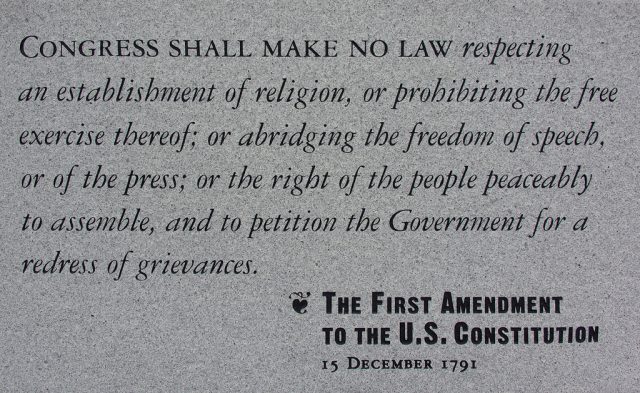
Major Internet service providers have seemingly given up on the argument that net neutrality rules violate their First Amendment rights. But one small ISP is continuing its fight against the Federal Communications Commission, claiming that it should be allowed to favor some Internet content over others because doing so qualifies for freedom of speech protection.
"With prioritization, broadband providers convey a message by 'favor[ing]' certain speech—that prioritized content is superior—because it is delivered faster," Alamo Broadband argued in a brief filed yesterday as part of the broadband industry's lawsuit against the FCC.
Alamo Broadband uses fixed wireless technology to provide Internet access to about 1,000 customers outside San Antonio, Texas. Alamo filed the brief with Daniel Berninger, a communication architect who worked on the development of VoIP technology in the mid-1990s. Alamo previously claimed that net neutrality rules "eliminate Alamo’s discretion to manage Internet traffic," while Berninger claimed the net neutrality ban on paid prioritization "precludes him from offering high-definition voice services that require prioritization."
The FCC's net neutrality rules prevent ISPs from blocking and throttling lawful Internet content and outlaw prioritization of Internet content in exchange for payment.
"By foreclosing prioritization, the Order restricts broadband providers’ editorial discretion to favor their own and unaffiliated Internet content," Alamo and Berninger wrote in their brief filed in the US Court of Appeals in Washington, DC. "It also infringes the speech of edge providers like Berninger who wish to distinguish their content and services by having them delivered faster."
An ISP favoring certain Internet content "is no different than a cable operator favoring popular channels by placing them on particular cable tiers," they wrote. ISPs already "exercise editorial discretion" by blocking content that is unlawful or harmful, such as child pornography and spam, they argued.
"Broadband providers do not surrender their editorial discretion by electing to transmit all lawful content any more than an individual surrenders his free speech rights by not speaking," the Alamo/Berninger brief said.
The FCC's net neutrality ruling addressed some of these arguments before Alamo even made them, noting that the no-blocking rule applies only to lawful Internet traffic and thus doesn't prevent ISPs from refusing to transmit unlawful content including child pornography and copyright-infringing materials. The FCC's rules do not supersede any obligations broadband providers have to law enforcement agencies. The Commission's net neutrality ruling also said that spam protection is an "information service," separate from the core telecommunications service that is subject to common carrier and net neutrality rules.
The FCC also disputed Alamo's First Amendment argument in a brief filed last month. It argued that broadband providers are conduits for the speech of others, acting in the same role as telephone companies by delivering content requested by customers. Nobody reading The New York Times or Wall Street Journal editorial pages would mistake the newspapers' views for the broadband providers', the FCC said, further noting that "the Supreme Court has repeatedly cautioned that common carriers do not share the free speech rights of broadcasters, newspapers, or others engaged in First Amendment activity."
Alamo and Berninger countered yesterday that New York Times readers do not assume that the newspaper endorses the advertisements it publishes, "but the Times obviously has the right to select and print them."
As for whether a VoIP provider's free speech rights are violated if it is unable to purchase prioritization from an ISP, the FCC said the fact that its rules "might govern certain business conduct has nothing to do with speech."
Big ISPs abandon First Amendment claims
The First Amendment argument against net neutrality rules goes back a few years. Verizon claimed in 2012 that the FCC's first attempt at net neutrality rules violated its First Amendment free speech rights and its Fifth Amendment property rights. The argument didn't stick, but Verizon ultimately won its case on other grounds.
ISPs raised the First Amendment argument again in May of this year when challenging the FCC's latest net neutrality rules. AT&T, CenturyLink, CTIA-The Wireless Association, and the United States Telecom Association all claimed the FCC's rules violate their First and Fifth Amendment rights. The American Cable Association challenged on Fifth Amendment grounds but not First Amendment grounds, while the National Cable & Telecommunications Association didn't mention any Constitutional amendments.
With the case moving forward, the major ISPs and trade groups have been filing joint briefs instead of separate ones. Perhaps because they don't agree on the Constitutional arguments, their latest briefs focus only on non-Constitutional claims. Their brief filed yesterday argues that Internet access is not a telecommunications service and thus ISPs cannot be regulated as common carriers. The broadband providers also argued that a new "Internet conduct standard" is unlawfully vague and that the FCC failed to provide sufficient public notice before enacting certain parts of the net neutrality order.
reader comments
137